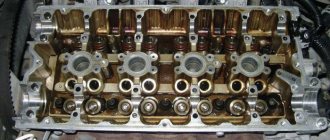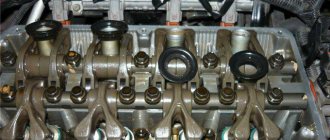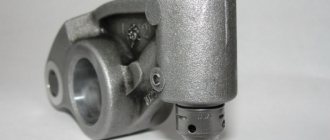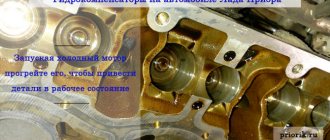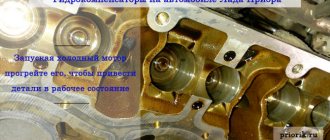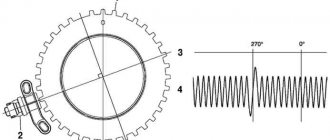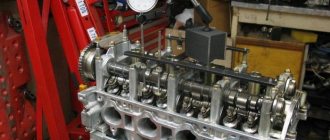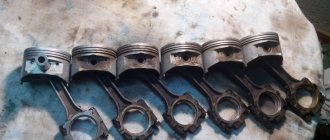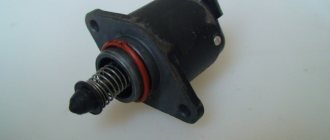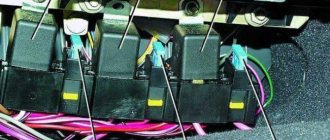The knock of hydraulic compensators on the 16-valve VAZ 2112 engine is distinguished quite simply, and determining the cause is not difficult. So, you can eliminate the cause of the knocking in a fairly simple and proven way.
Video about replacing hydraulic compensators, it shows possible causes of knocking:
The video story will tell you how to replace hydraulic compensators, as well as diagnose them in case of extraneous knocks and sounds.
How to understand that the hydraulic compensators of the VAZ 2112 are knocking?
It is very easy to check the hydraulic compensators: you need to remove the valve cover, bring the crankshaft to a position where the cams will not act on the compensators, and then press on the piston. If the hydraulics are working properly, the piston will move down, if not, it will stop!
This often happens due to insufficient oil. You can understand what exactly is knocking in the engine by the following characteristic signs:
- If the knocking noise disappears only at high speeds, it means that there is a faulty ball piston hidden somewhere, it must be detected and the failed compensator replaced
- When it starts knocking on a warm engine, this is a sure sign that the hydraulic valve has worn out and has completely exhausted its service life.
- If knocking occurs at high speeds, there is most likely excess oil in the system. The lubricant gets onto the cylinder head and disrupts the functioning of the compensators
Signs of knocking hydraulic compensators when hot
It is very important for a car enthusiast to know how to understand that one or more hydraulic compensators are knocking. After all, its knocking can easily be confused with other sounds due to problems with the piston pin, crankshaft liners, camshaft or other parts inside the engine.
The knocking of hydraulic compensators when hot can be diagnosed by opening the hood. The sounds will start coming from under the valve cover. The tonality of the sound is specific, characteristic of metal parts hitting each other. Some compare it to the sound of a chirping grasshopper. What is typical is that knocking from faulty compensators occurs twice as often as the engine speed. Accordingly, when the engine speed increases or decreases, the knocking sound from the hydraulics will behave accordingly. When you release the gas, you will hear sounds as if your valves are not adjusted.
How to eliminate knocking on a VAZ 2112?
The reasons for the appearance of knocking noise from hydraulic compensators are quite clear: natural wear, low-quality engine oil, lack or excess of lubricant in the system. Monitor the engine oil level; if necessary, top up, don’t skimp. Also, you don’t need to save on oil changes - it’s more expensive for yourself.
As practice shows, repairing expansion joints is a waste of nerves and time. It is also impractical and, in the end, unprofitable. Check all the elements again, most likely one of the hydraulic valves is knocking. Replacing hydraulic lifters is a simple job.
For normal operation, hydraulic compensators require an uninterrupted supply of oil, which is supplied under pressure. The supply occurs through a special channel with a check ball valve, which prevents oil from draining from the channel after the engine is stopped. In addition, there are channels located on the lower plane of the bearing housing, which supply oil to the camshaft journals.
Hydraulic compensator design:
To enlarge the image click on the image!
The disadvantage of hydraulic compensators is their excessive sensitivity to the quality and purity of the oil. The presence of mechanical inclusions and other foreign elements in the oil leads to rapid failure of the hydraulic compensator plunger pair. This malfunction is most often accompanied by increased noise emission and intense wear of the camshaft cams.
What to do when hydraulic compensators knock when hot
The only way to get rid of the knocking is to find out and eliminate its cause. What happens next will depend on the current situation.
First of all, you need to check the oil level in the crankcase . How it will circulate through the oil channels will depend on it. It is also worth making sure that the oil pressure is sufficient , even if the oil lamp light does not light up.
Incorrect engine oil level and pressure will affect not only the operation of the hydraulic compensators, but also the operation of the engine as a whole!
Each engine has its own operating oil pressure and depends on its design (you need to check the documentation), however, it is believed that at idle speed the pressure should be about 1.6...2.0 bar. At high speeds - up to 5...7 bar. If there is no such pressure, you need to check the oil pump. Most likely due to oil dilution, its performance decreases. Often, in order to ensure pressure, the cause itself is not eliminated; when the hydraulic valves knock when hot, car enthusiasts fill in thicker oil when changing. But you should not overdo it, since oil that is too thick is difficult to pump through the system. What can cause oil starvation?
Moreover, there is no need to rush to judgment on the pump itself. Oil pump malfunctions can be caused by various reasons - wear of parts, malfunction of the pressure reducing valve, wear of the working surfaces of parts, and its operation can also deteriorate if the oil receiver screen is simply clogged. You can see if there is dirt on the mesh by removing the pan. But there is no need to rush with such work. It can become dirty only if the general condition of the oil is poor or the oil system has been cleaned unsuccessfully.
Check the condition of the oil . Even if you change it according to the regulations, it could become unusable ahead of schedule (under difficult operating conditions of the machine, or you came across a fake). When plaque and slag are detected, it is often unclear what to do if the hydraulic compensators knock when hot. It is advisable to flush the oil system, because, most likely, the oil channels could be clogged. To check the condition of the oil, just do a small drop test.
Most often, the problem can be solved simply - just change the oil and oil filter. Or it’s simply time to change the hydraulic compensators.
How to check hydraulic compensators
You can check hydraulic compensators using one of three methods:
- Using a car stethoscope . However, this method is only suitable for experienced car enthusiasts who know how to “listen” to the engine. By applying it to different areas where hydraulic compensators are located, you can compare the sounds emanating from there.
- Using control probes . To do this, you need special control probes with a thickness of 0.1 to 0.5 mm. Accordingly, on a hot engine, you need to check the distance between the hydraulic compensator and the cam using feeler gauges. If the corresponding distance is more than 0.5 mm or less than 0.1 mm, then the hydraulic valve being tested is unsuitable and must be replaced.
- Indentation method . This is the simplest and most common verification method. However, to perform this, the hydraulic compensators must be removed from the engine. After this, you need to use a wooden block or a screwdriver to try to press the central rod of the compensator inward. If the compensator is working properly and is in more or less normal condition, it is unlikely that you will be able to simply press it with your finger. Conversely, the rod of a faulty compensator will easily fall inward.
The last method of checking can also be performed without removing the hydraulics from the engine, however, this will not be as convenient and the result will not be as obvious. Usually, failed hydraulic compensators are replaced with new ones, but in rare cases you can try to restore it by washing. Another option is to clean and repair the hydraulic compensator. As practice shows, repairing and cleaning the hydraulic valve rarely helps, but it’s still worth trying to restore it. When you decide to change, it is better to replace the entire set, otherwise the situation will repeat itself soon, but with different hydraulics.
If you drive with knocking hydraulic compensators for six months or longer, then when you remove the valve covers, there is a high probability that on the very “bed” of the camshaft, below, there will be burrs from the rockers (rocker arms). Therefore, decide for yourself whether it is possible to drive with the knocking of hydraulic compensators.
Let's summarize. Hydraulic lifters are knocking - reasons
- Hydraulic lifters can knock due to problems with oil, including the fault of a faulty oil system, as well as as a result of a mechanical malfunction of the hydraulic compensator itself.
- If hydraulic compensators knock when cold , but the knock disappears when hot, then, according to experienced mechanics, there is nothing wrong with this; this phenomenon occurs in most car owners.
- If the hydraulic compensators knock when hot , that is, after the engine has warmed up to operating temperature, this is a clear sign of a malfunction that must be eliminated immediately.
conclusions
The reasons for the knocking of hydraulic compensators are quite simple, and their classification immediately indicates the reasons for the occurrence of this effect. The main method of troubleshooting remains a comprehensive replacement of all products.
I remember trying to install hydraulic compensators on the “six” so as not to set the valve clearances. The car immediately became dumber. A year later, during the next renovation, I removed them. And on the “twelfth” they are still working well. To avoid foam, you need to fill in high-quality oil.
I noticed that my hydraulic compensator was starting to tap, so I went to take a look. It turned out to be worn out and had to be replaced with a new one.
Sometimes you just need to change the engine oil and the knocking goes away. That is, if you change the oil at the wrong time (more than 10,000) due to dirt, let’s say they get stuck.
On a 2110 16 valve, after the engine warms up to 70′, a metallic knock or a clatter appears, and so on constantly while the engine is hot, when cold it works normally, without this clatter, what is the reason?
Problems in the oil system that can cause knocking in hydraulic compensators:
- Clogged oil channels (dirt in the channels, plaque);
- Airy oil system (air present in the system increases the compression ratio of the oil). Air in the oil can occur as a result of high or low oil levels;
- Clogged oil filter;
- The wrong oil has been filled in (does not match: viscosity, fluidity, quality, temperature characteristics);
- There may be interruptions in the operation of the oil pump;
- Overheating of the engine, as a result of which the oil burned, losing its viscous and lubricating properties.
How to check hydraulic compensators - video
Replacement
Experienced car enthusiasts advise replacing hydraulic compensators as a set. They wear about the same. Therefore, if one fails, the other will soon fail. To replace the hydraulic valves, you will have to remove the camshafts, as well as some other engine parts. In principle, the work is not difficult and does not take much time. This should only be done on a completely cooled engine.
For greater reliability, you need to change the engine oil at the same time. When you first start the engine, do not be alarmed; you may still hear the same knocking noise. It will end after half a minute, as soon as the required amount of oil is filled into the hydraulic compensator. If replaced correctly, the motor will run quietly for a long time.
Conclusion
. The engine on the “two-wheeler” has a lot of advantages; it is quite resourceful, and at the same time not gluttonous. But it has one drawback, valve knocking. Therefore, novice drivers often ask what to do if valves or hydraulic compensators on a VAZ 2112 16 valves are knocking. Before answering this question, it is necessary to find out the exact reason for this phenomenon. After which, it can be eliminated.
How to solve the problem of knocking hydraulic compensators?
- You can try changing the oil if it has been changed for a long time or looks bad (dark brown color, bad smell, etc.). As a rule, after replacement, the knocking of hydraulic compensators disappears. If the knocking does not disappear, you will have to take out the main battery and see what’s wrong.
- If adding oil did not lead to anything, and washing the engine did not give any result, you can try another way to solve the problem of knocking hydraulic valves. The principle is to remove the main hydraulic valves, perform a visual inspection of them, in case of insignificant wear and normal condition, you can disassemble and wash the hydraulic compensators. When removing, I recommend remembering or writing down where which hydraulic compensator was installed. After washing, everything is assembled and the operation of the engine is checked; if washing the hydraulic compensators does not lead to anything, the only way out is to replace the hydraulic compensators .
Device
What to do if valves or hydraulic compensators on a VAZ 2112 16 valves are knocking? Before answering this question, it is necessary to understand the structure of the hydraulic compensator, which mechanics often abbreviate to “hydric”. It is from the peculiarities of its structure that the reason for some knocks follows.
The hydraulic compensator itself consists of a cylindrical piston, whose bottom receives the force from the camshaft pusher. There is a plunger located inside it. With its help, force is transmitted from the camshaft to the valve stem. The plunger moves quite freely in its seat. This is necessary to ensure a thermal gap. When the engine is running, the camshaft cam pushes the piston, which opens the valve through a plunger. The thermal gap is adjusted using oil supplied to the head under pressure. Accordingly, adjustment occurs by changing the pressure. To avoid oil leakage from the hydraulic valves during parking, a ball valve is used.
Which hydraulic compensator is knocking?
An experienced technician can do this by ear, using special acoustic diagnostics. After the problem has been identified, the device is dismantled and thoroughly washed with special liquids. After cleaning, they put it back in place and try to start the engine again. If the problem persists, the hydraulic compensator must be replaced. Although there are often cases when the last option does not always fix the problem, then you need to look for a breakdown in the lubrication system. To find out which hydraulic compensator needs to be replaced, watch the video.
Why do you need hydraulic compensators for the BAZ 2112?
My camshafts didn’t turn, I took everything apart, but I couldn’t get the hydraulics out. You press on them, they stand there dead, what could be the reason?
Thank you! Very necessary information. I'll try to change the oil, I'll write what happens.
When it’s cold, it doesn’t knock, or at least barely audibly, but as it warms up, the knocking intensifies. What should be the pressure when the engine is warmed up?
Thank you very much, I’ll also try to change the oil and filter. I'll see what happens.
I got my head full, completely new headers, but the knocking doesn’t stop
Why do the valves knock? The hydraulic compensator was changed, the oil too, the pressure sensor is on, the car does not pull.
The camshafts could be worn out, if new camshafts don’t help, then throw away the head
Consequences of knocking
Of course, you can drive with such a knock, but there is a golden rule of car enthusiasts, which states that “any small knock always grows into a big problem . And this is really, really true. Violation of valve clearances leads to a reduction in the service life of the gas distribution mechanism, as well as a deterioration in the dynamic characteristics of the car. Naturally, this will happen slowly and imperceptibly, but the general recommendation for each case is the same - contact a specialized car repair and maintenance service as soon as possible.
